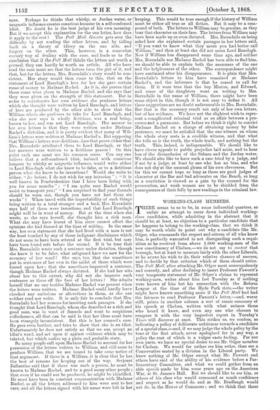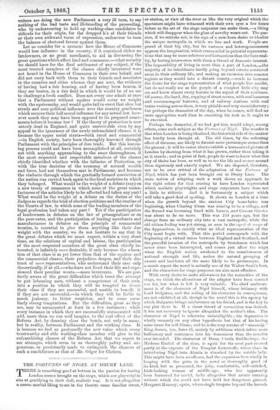WORKING-CLASS MEMBERS.
THERE seems to us to be, in some influential quarters, so unfair an attempt to sneer down individual working- class candidates, while admitting in the abstract that it should be, at least, no objection to a particular candidate that he happens to belong to the working-class, that we think it may be worth while to point out why a candidate like Mr. Odger, who commands the respect and esteem of all who know him, is perfectly warranted in not disregarding such a requi- sition as he received from above 1,000 working-men of the new constituency of Chelsea,—we do not say to contest that borough, but at least to measure fairly with the other Liberals, as he avows his wish to do, their relative chances of success, and to decide by that criterion which of them should retire. The Pall Mall, after attacking Mr. Odger most unscrupulously and coarsely, and after declining to insert Professor Fawcett's very temperate statement of Mr. Odger's claims to represent working-men, writes about him last Tuesday as if nothing were known of him but his connection with the Reform League at the time of the Hyde Park riots,—the writer might have known something more if the Pall Mall had had the fairness to read Professor Fawcett's letter,—and, worse still, prints in another column a sort of comic summary of his speech at Chelsea, written with what animus those who heard it know, and even any one who chooses to compare it with the very imperfect report in Tuesday's Times will discover at once. This strikes us, we confess, as indicating a policy of deliberate unfairness towards a candidate of a special class,—and, if we may judge the whole policy by the tone of the first attack, never apologized fcr in any way, a policy the root of which is a vulgar caste feeling. For our own parts, we have no special desire to see Mr. Odger member for Chelsea. We would far rather see him retire, than see a Conservative seated by a division in the Liberal party. We know nothing of Mr. Odger except what Mr. Fawcett and others have said of the ability of his evidence before a Par- liamentary Committee, and what we could gather from an able speech made by him some years ago on the American War, at St. James's Hall. But we should like to see him, or others of his class who would command as much confidence and respect as he would do, and as Mr. Bradlaugh would not do, in the House of Commons ; and we think that those
writers' are doing the new Parliament a very ill turn, to say nothing of the bad taste and ill-breeding of the proceeding, who by endeavouring to hold up working-class candidates to ridicule for their origin, for the dropped h's of their friends or their own awkward turns of expression, endeavour to turn the balance of electoral favour against them.
Let us consider for a moment how the House of Commons would lose influence in the country, if it contained either no landowners, or no great merchants, to aid in discussing the great questionswhich affect land and commerce,—what security we should have for the final settlement of any subject, if the most trusted members of the classes chiefly interested were not heard in the House of Commons in their own behalf, and did not carry back with them to their friends and associates in the counties and cities whence they are sent, the evidence of having had a fair hearing, and of having been beaten, if they are beaten, in a fair field in which it would be of no use to challenge a fresh conflict. Does not every one admit at once that a Parliament without squires would carry no weight with the squirearchy, and would quite fail to exert that slow but steady and sure political influence over the country gentlemen which secures their full moral influence for any actual law, how-
ever much they may have been opposed to its proposed enact- ments before it became law ? If the theory of protection is now utterly dead in England, and quite unrevivable even by any appeal to the ignorance of the newly enfranchised classes, it is because the upper social strata—both rural and commercial —in English society, have been thoroughly leavened through Parliament with the principles of free trade. But this leaven- ing process could not have been accomplished at all, certainly not with anything approaching to the same thoroughness, if the most respected and respectable members of the classes chiefly identified whether with the fallacies of Protection, or with the true doctrine of the economy of natural wealth and force, had not themselves met in Parliament, and become the viaducts through which the gradually formed conviction of the nation was carried back again to the local societies to which they belonged. What would be the weight of a debate (say) on a new treaty of commerce in which none of the great manu- facturers of the articles likely to be affected had taken any part? What would be the weight of a debate on the duties of the Judges as regards the trial of election petitions and the routine of the Courts of law, in which none of the leading members of the legal profession had taken any part ? Yet if the participation of landowners in debates on the law of primogeniture or on the poor-rates, and the participation of leading merchants and manufacturers in debates on the principle of commercial treaties, is essential to give them anything like their due weight with the country, we do not hesitate to say that in the great debates which we must expect, within a very short time, on the relations of capital and labour, the participation of the most respected members of the great class chiefly in- terested, is infinitely more desirable, if only because the educa- tion of that class is as yet lower than that of the squires and the commercial classes, their prejudices deeper, and their dis- trust of mere representatives, who understand their case only theoretically, if at all,—who have not lived their life and expe- rienced their peculiar wants,—more inveterate. We are per- fectly aware of the great difficulties which beset the attempt to put labouring men, without a competence of their own, into a position in which they will be tempted to desert their class if they are successful, and unable to benefit it if they are not successful, in which they will he liable to much jealousy, to bitter suspicion, and to some pecu- liarly strong temptations. But the difficulties, great as they are, may be surmounted at least in a few instances ; while every instance in which they are successfully surmounted will add, more than we can well imagine, to the real effect of the Reform Act, by drawing close the bonds, not only in name, but in reality, between Parliament and the working class. It is because we feel so profoundly the new value which every trustworthy and able working-class member will give to the enfranchising clauses of the Reform Act, that we regret to see attempts, which seem to us thoroughly paltry and un- generous, so persistently made to extinguish the chances of such a candidature as that of Mr. Odger for Chelsea.































 Previous page
Previous page